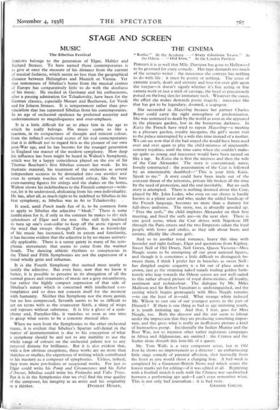THE CINEMA
Katia." At the Academy—"Sixty Glorious Years." At the Odeon "Old Iron." At the London Pavilion
PERHAPS it is as well that Mlle. Darrieux has gone to Hollywood to be groomed for crazy comedy. Her type demands too much of the scenario writer : the innocence she conveys has nothing to do with life : it must be poetry or nothing. The sense of extreme youth, death and eternity and love-for-ever glib upon the tongue—it doesn't signify whether it's fine acting or fine camera work or just a trick of carriage, the head so precariously poised on the long slender immature neck. Whatever the cause, the effect she makes demands poetic tragedy : innocence like that has got to be legendary, doomed, a scapegoat.
She succeeded in Mayerling because her partner Charles Boyer could carry the right atmosphere of predestination. She was sentenced to death by the world as soon as she appeared in the pleasure garden, lost in the boisterous darkness. In Katia the French have tried to repeat Afayerling—a meeting in a pleasure garden, royalty incognito, the girl's secret visit to the palace interrupted by a wife this time instead of a mother. We can see now that if she had stayed she would have been used over and over again to play the child-mistress of nineteenth- century royalties, until the time came when she couldn't make- up quite so young, and innocence would have been turned on like a tap. In Katia she is first the mistress and then the wife of the Czar Alexander. The story is conventional, naive, loosely constructed : the assassination of the Czar is followed by an interminable deathbed—" This is your little Katia. Speak to me." A story could have been made out of the
constant threat of the terrorists, private life broken all the time by the need of protection, and the end inevitable. But no such story is attempted. There is nothing doomed about this Czar, played by Mr. John Loder, who even on our shores is hardly known as a pliant actor and who, under the added handicap of the French language, becomes no more than a dummy for full-dress uniforms. The story, too, is absurdly speeded up. " Free the serfs," the child implores Alexander on their first meeting, and freed the serfs are—in the next shot. There is one good scene, when the Czar drives with Napoleon III through the Paris streets and the two Emperors salute the loyal people with bows and smiles, as they talk about boots and caviare, illicitly like chorus girls.
And so to another royal romance, heavy this time with lavender and right feelings, Elgar and quotations from Kipling. Sweet Nell of Old Drury, Nell Gwyn, Queen Victoria—Miss Neagle seems to be attempting all our great national figures, and though it is sometimes a little difficult to distinguish be- tween them, I think I prefer her in breeches as sweet Nell : her dimpled aseptic coquetry is a bit out of place under a crown, just as the straining naked naiads trailing golden bath- towels who leap towards the Odeon screen are not well-suited to this rather absurd picture of royal domesticities, all loyalty, sentiment and technicolour. The dialogue by Mr. Miles Malleson and Sir Robert Vansittart is undistinguished, and the casting which begins grotesquely with Miss Neagle remains —to say the least of it—odd. What strange whim induced Mr. Wilcox to cast one of our youngest actors in the part of Disraeli ? If there is one thing as bad as age imitating youth, it is youth imitating age. And that, I fear, goes for Miss Neagle, too. Both the director and the star seem to labour under the impression that they are producing something impor- tant, and this gives what is really an inoffensive picture a kind of humourless pomp. Incidentally the Indian Mutiny and the Boer War, not to mention other rather inglorious campaigns in Africa and Afghanistan, are omitted : the Crimea and the Sudan alone disturb this love-life of a queen.
Mr. Tom Walls is a very competent actor, but in Old Iron he shows no improvement as a director : an embarrassing little stage comedy of parental affection, shot hurriedly from the front as you would shoot a charging lion. A bad week is completed by a Gaumont-British News reel which scores the lowest marks yet for editing—if it was edited at all. Beginning with a football match it ends with the Chinese war sandwiched between a performing ape and—I can't even remember what. This is not only bad journalism : it is bad taste.
GRAHAM GREENE.










































 Previous page
Previous page